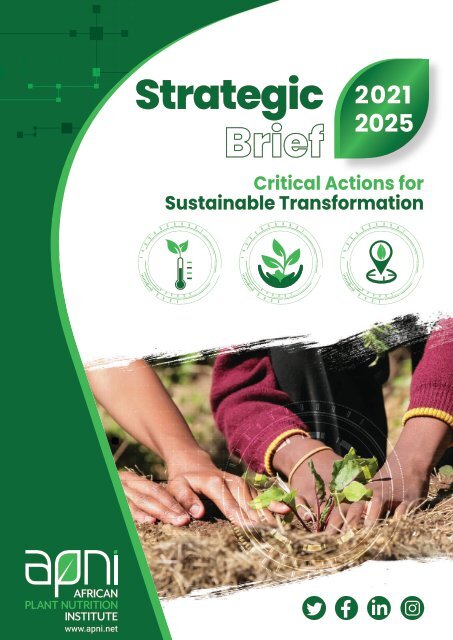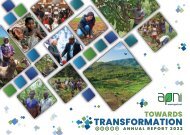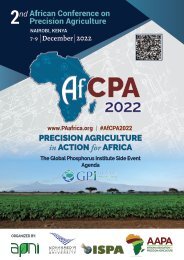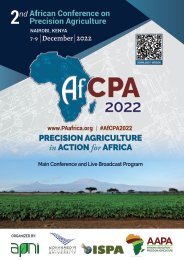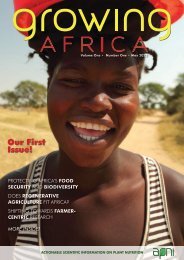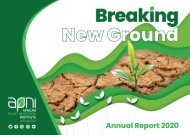APNI Strategic Brief 2021-2025
You also want an ePaper? Increase the reach of your titles
YUMPU automatically turns print PDFs into web optimized ePapers that Google loves.
<strong>Strategic</strong><br />
<strong>Brief</strong><br />
<strong>2021</strong><br />
<strong>2025</strong><br />
Critical Actions for<br />
Sustainable Transformation<br />
AFRICAN<br />
PLANT NUTRITION<br />
INSTITUTE<br />
www.apni.net
The African Plant Nutrition Institute (<strong>APNI</strong>) is a newly created not-for-profit research and<br />
development organization with core competence in plant nutrition. Our founders saw the<br />
critical need to improve soil fertility and plant nutrition in Africa with the goal of enhancing<br />
the livelihoods of farmers and rural communities, while also increasing the availability of<br />
nutritious food.<br />
Mission and Vision<br />
Vision: Prosperous African farmers sustainably managing crop nutrition to provide<br />
consumers with a secure supply of nutritious foods at a reasonable price.<br />
Mission: Enhanced plant nutrition for a resilient and food-secure Africa.<br />
<strong>APNI</strong> Headquarters<br />
Benguérir, Morocco<br />
North Africa<br />
Settat, Morocco<br />
The continental vision of <strong>APNI</strong><br />
is currently delivered through its<br />
headquarters in Benguérir, Morocco,<br />
and its regional offices in Nairobi,<br />
Kenya; Yamoussoukro, Ivory Coast;<br />
and Settat, Morocco.<br />
West Africa<br />
Yamoussoukro, Ivory Coast<br />
East & Southern Africa<br />
Nairobi, Kenya<br />
<strong>APNI</strong>’s expertise is in plant nutrition. Therefore,<br />
<strong>APNI</strong>’s overriding goal is to make this expertise<br />
available to improve crop performance through<br />
better management of plant nutrients and enhanced<br />
soil health. Implementing better plant nutrient<br />
management practices will lead to productive and<br />
sustainable landscapes, and prosperous livelihoods.
Foreword<br />
<strong>Strategic</strong> Vision of <strong>APNI</strong><br />
Welcome to the <strong>Strategic</strong> Vision of the African Plant Nutrition Institute<br />
(<strong>APNI</strong>). Developing the strategy for a new Institution is an exciting yet complex<br />
enterprise. More so when the process identifies the niches for an Institute<br />
operating in the diverse space of agricultural development in Africa.<br />
As rapid population increase drives up the requirement for agricultural commodities<br />
in Africa, the options for the Continent would appear either to produce its own, or import<br />
from elsewhere. With 60% of the global uncultivated agricultural land bank, the choice<br />
should be obvious. However, in reality, crops yields are low and over half of the arable<br />
land is degraded. The quest for fertile land is creating biodiversity and ecological<br />
challenges, millions of smallholder farmers are in subsistence mode, and food and<br />
nutritional insecurity is high. With our core competence in plant nutrition research and<br />
development, we see a clear role for <strong>APNI</strong> to activate the fundamental changes needed for<br />
sustainable transformation of agricultural systems in Africa.<br />
Dr. Kaushik Majumdar,<br />
Director General
The low fertility of African soils, aggravated by many<br />
years of farming without enough nutrient replenishment,<br />
is a major contributing factor to the low crop yields<br />
achieved, and the subsequent negative social, economic,<br />
and environmental impacts. The role of plant nutrition in<br />
improving crop yield is well recognized globally. However,<br />
it is not only about yields anymore.<br />
<strong>APNI</strong>’s research for development<br />
is geared at contextualizing nutrient management<br />
through a clear understanding of constraints.<br />
Our Institute will communicate data, information<br />
and knowledge freely to support other<br />
institution’s efforts to build capacity and address<br />
the range of challenges faced.<br />
To be effective, plant nutrition must be precise enough to<br />
deliver both improved nutrient use efficiency and reduced<br />
ecological impact from agriculturally applied nutrients. We<br />
believe these co-benefits should be pursued as vigorously<br />
as the biggest challenges to humanity in the 21st Century.<br />
To be sustainable, plant nutrition needs to improve soil<br />
health to enable the production of large quantities of<br />
high-quality food and commodities, especially under the<br />
anticipated climate trends and weather variations that<br />
are increasing the uncertainty in African productions<br />
systems. These themes define the strategic niches<br />
of <strong>APNI</strong>. Working closely with strategic partners and<br />
farmers, the committed researchers and educators of<br />
<strong>APNI</strong> will focus on understanding the fundamentals<br />
behind deriving multiple benefits through precise nutrient<br />
management and associated best agronomic practices;<br />
and deliver solutions that help large numbers of farmers<br />
make tailored decisions for their crops and growing<br />
environments.<br />
The conundrum around the low adoption of improved plant<br />
nutrition practices in Africa cannot be solved through<br />
better science only. Farmers must have access to the right<br />
fertilizers at the right time, access to the right advice and<br />
knowledge to use fertilizer properly, and finally access to wellpriced<br />
markets that can translate fertilizer investments into<br />
higher income, farm prosperity, and resilient social structures.<br />
However, the lack of well-developed infrastructure affects the<br />
whole value chain. Farmers in general, and women and youth<br />
farmers in particular, face major bottlenecks in navigating<br />
this gamut of challenges.<br />
<strong>APNI</strong>’s research for development is geared at contextualizing<br />
nutrient management through a clear understanding of<br />
constraints. Our Institute will communicate data, information<br />
and knowledge freely to support other institution’s efforts to<br />
build capacity and address the range of challenges faced.<br />
Effective and efficient plant nutrient management provides<br />
one of the biggest levers for future food and nutritional<br />
security, climate resilience, and poverty alleviation in Africa.<br />
The strategic thrust of <strong>APNI</strong> is well positioned to contribute<br />
to the desired change.<br />
This document was enriched by the collective expertise<br />
of scientists, educators, extension specialists and policy<br />
makers well rooted in the agricultural developmental issues<br />
in Africa. I am grateful to each of these excellent partners<br />
and well-wishers, our external consultants Dr. Ed Rege and<br />
Dr. James Cock, the Scientific Advisory Committee, the<br />
<strong>APNI</strong> Board and its Chairman, Mr. Hicham El Habti, and our<br />
exceptional staff for their support in defining the Institute’s<br />
strategy for the next five years.<br />
Dr. Kaushik Majumdar, Director General
African Agriculture<br />
Africa is now home to more than one<br />
billion people, with the fastest rate of population<br />
growth on the earth. African agriculture trails other<br />
parts of the world in both land and labour productivity.<br />
Food prices in Africa are consistently higher than in<br />
the rest of the world. Africa now imports more than<br />
a quarter of its cereal needs. One in five Africans is<br />
undernourished and many millions more live with food<br />
insecurity. There is clearly a need for a sustainable<br />
increase in the productivity of African agriculture.<br />
Over the past fifty years, crop yields have increased in<br />
most of the world to meet the demand for agricultural<br />
products. These productivity gains lessen the need<br />
to bring new land under cultivation, thereby reducing<br />
the pressure to convert forests and other fragile<br />
environments to crop land. These gains in crop yields<br />
have been invariably accompanied by more effective<br />
plant nutrition, based on proper fertilizer use and<br />
improved soil fertility management. However, yields in<br />
Africa in the past five decades have increased little, while<br />
the area of cropped land has almost doubled. Despite<br />
this massive expansion in farmland, population pressure<br />
continues to drive down farm size and the locally<br />
produced food supply per capita declines.<br />
Africa’s population and annual population<br />
increase (current and projected).<br />
Percent change in cereal crop yield and area for Africa<br />
and the World (1968 vs. 2018).<br />
3<br />
2.5<br />
2<br />
+41.7 M/yr<br />
Yield<br />
Current yield average = 1.6 t/ha<br />
Current yield average = 4.0 t/ha<br />
75%<br />
135%<br />
Billion<br />
1.5<br />
1<br />
0.5<br />
0<br />
Source: OWID<br />
+32.7 M/yr<br />
2020 2050<br />
105%<br />
Area<br />
5%<br />
Africa<br />
World<br />
0% 50% 100% 150%<br />
Source: FAOStat
Properly managed soils supporting resilient<br />
and abundant crops will be pivotal to the development of profitable and productive<br />
agricultural value chains and is an essential step to greater equality and a better life in Africa.<br />
Degraded soils are common<br />
across Africa and this insidious environmental<br />
damage continues to spread as soils are intensively<br />
cropped and additional land is brought into<br />
cultivation. Fertilizer application rates in Africa are<br />
only about 20% of the world average, leading to<br />
inadequate nutrient replacement and contributing<br />
to low farm productivity, declining soil fertility,<br />
and further land degradation. Caught in this cycle,<br />
countless farmers and farm workers live in poverty,<br />
often supporting their livelihoods with off-farm and<br />
part-time employment.<br />
Furthermore, African agriculture is providing neither<br />
sufficient quantity nor the variety of food needed to<br />
sustain a healthy population. The situation is further<br />
complicated by Africa’s complex mix of agro-ecosystems<br />
with a diverse range of crops, farming systems, and<br />
landscapes that are continually affected by short-term<br />
weather aberrations and long-term climate change.<br />
Food security in Africa may be considered from three<br />
distinct points of view:<br />
s s s<br />
the poor who have neither the resources to produce<br />
nor the purchasing power to buy sufficient food;<br />
the better off who do not always have access to<br />
healthy food options; and<br />
national food security.<br />
For the rural poor, especially those who do not<br />
produce enough to feed themselves, the priority<br />
is to help them become more prosperous so they<br />
can purchase sufficient nutritious food to satisfy<br />
their food needs. For those with higher disposable<br />
incomes, the provision of healthy foods is often<br />
taken for granted. However, increased availability of<br />
healthier foods would make it easier for all citizens<br />
to obtain an appropriate diet. At the national level,<br />
food security depends on government policies that<br />
guarantee the supply of basic foodstuffs, even during<br />
times of crisis.<br />
Ensuring the availability of plentiful low-priced staple<br />
foods, abundant healthier food products, and prosperity<br />
in the rural sector requires a strategic division of roles<br />
within the farming community, with each sector requiring<br />
distinct support.<br />
s s s s<br />
The small-scale farmer is limited in access to land<br />
and must produce more value per unit of land area to<br />
become prosperous.<br />
The larger African farms need to increase both land<br />
productivity and labour productivity to build a domestic<br />
food supply less reliant on imported food.<br />
The millions of African small-holder women farmers<br />
who are often the cornerstone of household food<br />
security require better access to land, inputs, capital,<br />
information, marketing opportunities, and decision<br />
support to increase their land and labour productivity.<br />
The rapidly increasing youth population needs<br />
functional and productive agricultural value chains,<br />
supported by modern farm technology and methods<br />
that take the drudgery out of farming and make life on<br />
the farm interesting, fulfilling, and prosperous.<br />
3.<br />
FOOD SECURITY:<br />
Points of View<br />
national food<br />
security<br />
1.<br />
2.<br />
the resource<br />
poor<br />
the better off who lack<br />
access to healthy food options
<strong>APNI</strong> will provide support to increase the productivity and the quality of high-value and<br />
staple food crops for small, medium, and large-scale farms as a contribution to<br />
(i) increased prosperity in rural areas; (ii) greater accessibility of healthy food; and (iii) a<br />
secure supply of low-cost staple foods.<br />
Catalytic Role of <strong>APNI</strong> in<br />
Knowledge Generation and Dissemination<br />
Improved plant nutrition, particularly<br />
greater adoption of appropriate rates of balanced<br />
fertilization, is an essential ingredient for increased<br />
productivity in African agriculture. Appropriate genetic<br />
material, better pest control, increased access to<br />
irrigation and mechanization, improved financing and<br />
market access, and a better-educated work force all play<br />
a part in increasing agricultural productivity. However,<br />
none of these advances will make a major impact without<br />
adequate and balanced fertilizer use. <strong>APNI</strong>’s strategy<br />
revolves around providing information, knowledge and<br />
critical methodologies to partners who help African<br />
farmers improve plant nutrient management for a wide<br />
range of crops and farming systems.<br />
African agriculture is highly diverse. There are relatively<br />
few staple commodity crops, while a large number of<br />
high-value crops and differentiated crop products<br />
exist. <strong>APNI</strong> has the opportunity to develop novel<br />
research strategies for high priority crops using modern<br />
information technology, remote sensing, and big data<br />
analytical techniques to efficiently generate knowledge<br />
on appropriate crop nutrition.<br />
<strong>APNI</strong> will be at the forefront of developing these<br />
innovative methodologies with strategic partners,<br />
ensuring that they will be applied to multiple crops<br />
grown over a range of conditions.<br />
<strong>APNI</strong> develops fundamental and applied knowledge, know-how, and<br />
methodologies. By working closely with strategic research and<br />
development partners, we ensure that these advances are<br />
adapted to specific local conditions and crops and<br />
then adopted by farmers.
<strong>APNI</strong> will work closely with national and international partners to understand the<br />
social, commercial, infrastructural, policy, and economic reasons for the low adoption<br />
of modern plant nutrition practices.<br />
Rather than working directly on the<br />
entire array of crops and cropping systems, <strong>APNI</strong> plays<br />
a catalytic role in targeting selected high-priority crops,<br />
assisting multiple agencies from the public, quasi-public<br />
and private sectors to improve the nutrition of crops and<br />
the cropping systems with which they are associated.<br />
While research and innovation are at the heart of <strong>APNI</strong>,<br />
there is also an urgent need to build the capacity<br />
of African farmers, agronomists, and academics<br />
so they can develop and adapt appropriate nutrient<br />
stewardship practices for their specific crops and<br />
environments. Education on proper plant nutrition is<br />
clearly a fundamental part of this process and <strong>APNI</strong> will<br />
work with key partners in facilitating education that<br />
empowers relevant institutions and practitioners.<br />
This collaborative effort involves working with<br />
stakeholders to assemble plant nutrition information<br />
in user-appropriate formats and to provide<br />
accessible and impactful information.<br />
A thorough understanding of why African farmers do<br />
not use more fertilizer is a vital step to overcoming<br />
current constraints on improved crop nutrition.<br />
This knowledge will be shared with national<br />
agencies, policy-making bodies, businesses, and<br />
collaborators in the fertilizer value chain as a key<br />
element in their efforts to remove these constraints<br />
and stimulate greater fertilizer use in Africa.<br />
Average Fertilizer Application Rates per Hectare of Arable Land (2007 to 2017).<br />
Nutrients kg N+P 2 O applied, 5 +K 2 O per kg/ha<br />
Source: FAOStat<br />
140<br />
120<br />
100<br />
80<br />
60<br />
40<br />
20<br />
0<br />
2007 2009 2011 2013 2015 2017<br />
World<br />
North Africa<br />
Sub-Saharan Africa
Critical Actions for<br />
Sustainable Transformation<br />
While many principles of<br />
plant nutrition have been well explored, <strong>APNI</strong> has<br />
identified two themes where major knowledge<br />
gaps still hamper progress in Africa: i) Climate and<br />
Weather-Smart Plant Nutrition, and ii) Soil Health<br />
for Improved Livelihoods. <strong>APNI</strong> will link these two<br />
themes into a third theme of iii) Precision Nutrient<br />
Management, which applies concepts of sitespecific<br />
precision agriculture to plant nutrition.<br />
Adoption of precision agriculture—based on data<br />
capture, information interpretation and analysis,<br />
and implementing a management response—will<br />
certainly improve plant nutrient management<br />
decisions. By working with data from multiple<br />
sources, including farmer knowledge and<br />
experience, <strong>APNI</strong> can address a much wider range<br />
of soil types, weather conditions, cropping systems,<br />
and landscapes than with traditional experimental<br />
methodologies alone.<br />
This approach opens the way to provide farmers<br />
with information tailored to the specific conditions<br />
farmer’s face throughout their fields. <strong>APNI</strong> will<br />
develop template methodologies to capture<br />
and analyse information and then convert the<br />
generated knowledge into actionable, scaleindependent<br />
information. This will be of great value<br />
to our partners who can apply these templates<br />
while addressing opportunities in a wide range of<br />
cropping situations.<br />
Modern communication systems offer prospects<br />
for farmers to interact with others to share<br />
experiences and obtain information and guidance<br />
on how to make better decisions. Thus, we<br />
envisage farmers being able to easily obtain<br />
information and exchange knowledge on inputs<br />
and services, price and weather forecasts, plant<br />
nutrient strategies, and other management<br />
options that improve their farming practices.<br />
We expect that by incorporating skills in<br />
managing modern information technology,<br />
farmers can actively share information and<br />
participate in knowledge generation. As modern<br />
technology and information become easily<br />
accessible, life on the farm will be more attractive,<br />
especially for the youth, many of whom are<br />
currently leaving the rural life in the hope of<br />
finding more appealing opportunities in the city.
<strong>APNI</strong> develops fundamental and applied methodologies to capture and analyse agronomic<br />
information and then convert that knowledge into actionable scale-independent practices<br />
that partners will apply to a wide range of cropping systems.<br />
Agricultural research on plant<br />
nutrition in Africa has largely concentrated on the<br />
biological and physical aspects of how to produce<br />
higher yields of basic staples and commodity crops.<br />
Despite this research, Africa lags the world in fertilizer<br />
use, and soil health is too frequently overlooked.<br />
Complex socio-economic conditions and the diversity<br />
of African society underlie the chronic deficit in the<br />
plant nutrition required to achieve food security.<br />
This scenario prompts us to consider the many barriers<br />
to increased nutrient use as a means to improve<br />
crop growth and soil health in Africa. A thorough<br />
understanding of why farmers are unable to maintain<br />
soil health and provide adequate crop nutrition is<br />
an essential component for the development of<br />
sustainable precision nutrient management.<br />
<strong>APNI</strong> will work closely with national and<br />
international partners to understand the social,<br />
infrastructural, political, and economic reasons<br />
for low adoption of improved plant nutrition,<br />
especially commercial fertilizer use, in Africa.<br />
This knowledge will be made available to national<br />
agencies, policy-making bodies, and businesses<br />
in the fertilizer value-added chain to help them<br />
remove these constraints.<br />
.
THEME ONE:<br />
Climate & Weather-Smart<br />
Plant Nutrition<br />
C<br />
limate change affects plant nutrition, in part, through increasingly variable weather<br />
patterns. <strong>APNI</strong> will explore the consequences of both slowly changing climate trends and the more<br />
frequent weather extremes on farming systems, and generate strategies on how farmers can adapt<br />
plant nutrient management practices to these novel conditions.<br />
These climate insights will then be used to provide guidance on<br />
(i)<br />
(ii)<br />
how changing weather patterns influence the interactions of crop nutrition and yield,<br />
the nutritional quality of food, and soil health;<br />
adjusting plant nutrition interventions to variation in weather patterns; and<br />
(iii) farm management options for reducing the effect of plant nutrition practices<br />
on climate change.<br />
<strong>APNI</strong> will partner with agencies<br />
that have the expertise on climate change and<br />
forecasting probable weather patterns, paying special attention<br />
to the random variation surrounding the long-term trends.
THEME THEME TWO: TWO:<br />
Soil Health for<br />
Improved Livelihoods<br />
This theme brings together existing and new knowledge on the impact of plant<br />
nutrition on soil health. The potential of plant nutrition to simultaneously boost soil health and<br />
crop quality has not yet been extensively explored. There are many unexploited opportunities<br />
for plant nutrition interventions to improve soil health, crop quality, and the nutritional value of<br />
human food and livestock feed. However, farmers are unlikely to adopt improved management<br />
practices that enhance soil health and crop quality unless there are incentives.<br />
We will also explore how plant nutrients can be managed within healthy agricultural systems and<br />
landscapes to sustain yields of more nutritious and better-quality crops. Under this theme, <strong>APNI</strong> will<br />
(i) evaluate the role of plant nutrients in enhancing soil health;<br />
(ii) develop business models that provide better livelihoods for farmers from healthy<br />
soils and greater crop quality associated with proper plant nutrition; and<br />
(iii) assess how balanced plant nutrition confers benefits through the soil-plantanimal-human<br />
health continuum.
THEME THEME THREE: TWO:<br />
Precision<br />
Nutrient Management<br />
The precision nutrient management theme brings together knowledge from<br />
multiple sources (including those generated in Themes One and Two) to provide African<br />
farmers with the capacity, information-management tools, the social and economic<br />
environment, and other resources required to provide better nutrition for crops. The requisite<br />
research and development for precise nutrient management relies on co-innovation with<br />
strategic partners from a wide range of agencies and businesses working together.<br />
Research will provide the knowledge required for the establishment of social, policy,<br />
commercial, and technical environments that foster enhanced plant nutrition. This outcome<br />
will empower farmers to better manage the source, rate, time, and place of crop nutrition<br />
within their specific environmental, social, and economic context. Under this theme, <strong>APNI</strong> will<br />
(i)<br />
(ii)<br />
(iii)<br />
(iv)<br />
(v)<br />
develop protocols and processes for obtaining and analysing information on plant nutrition<br />
and its interactions with cropping systems, soil health, crop yield, and product quality;<br />
generate data according to the FAIR* Guiding Principles;<br />
implement decision-support systems for precise nutrient management;<br />
establish networks for scaling knowledge and building capacity in precision nutrient<br />
management; and<br />
identify the reasons for low fertilizer use by farmers to enable changes in policy and<br />
infrastructure.<br />
.*Fair data meet the standard of being Findable, Accessible, Inter-operable,<br />
and Reusable.
Well-fed Crops for a Well-fed Africa<br />
We Believe<br />
• in the power of knowledge to make the world a<br />
better place;<br />
• success is achieved by teams, with each member<br />
contributing distinct talents and skills;<br />
• our knowledge should be evidence-based and<br />
freely shared;<br />
and We<br />
• are committed to a better-fed Africa and a more prosperous<br />
rural sector, with none left behind;<br />
• strive for interventions that lead to a healthy, congenial, and productive rural environment;<br />
• know that without improved plant nutrition, African agriculture will lag the rest of<br />
the world;<br />
• respect the opinions and beliefs of partners, so that together we can reach our<br />
common goals;<br />
• depend on the wisdom and knowledge of others;<br />
• learn from our experience and interaction with others;<br />
• do not tell others what to do, rather help them make informed decisions;<br />
• embrace FAIR data management policies and offer access to data from our research<br />
and development activities;<br />
• are a service-oriented organization, working with partners to make farmers more<br />
prosperous; and<br />
• maintain high ethics and professional standards in all that we do.<br />
<strong>APNI</strong> Offices:<br />
Headquarters - Benguérir, Morocco<br />
North Africa - Settat, Morocco<br />
West Africa - Yamoussoukro, Côte d’Ivoire<br />
East & Southern Africa - Nairobi, Kenya<br />
www.apni.net


